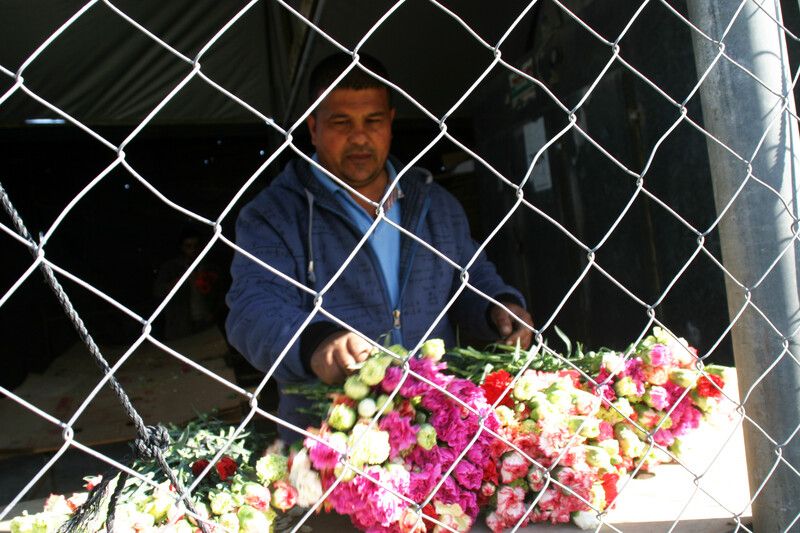The Electronic Intifada Rafah 16 January 2012

Ayman Siam’s flower export business has suffered a loss of nearly a million dollars since Israel imposed its crippling blockade on the Gaza Strip.
IPSRAFAH, Gaza (IPS) - Ayman Siam, 41, is not growing carnations as usual this year. It’s limonium and statice flowers instead because they are hardier. Given the risks imposed by Israel’s blockade of Gaza, it’s a political decision.
Earlier this month Israel allowed four trucks of strawberries and flowers out of Gaza, in a slight easing of a stranglehold on exports. But as an exporter who has suffered heavy losses over the past five years through the Israeli blockade, Siam needs to cut his risks.
“The business loss I suffered from growing carnations comes close to a million dollars, including the cost of the plants and fertilizers,” Siam said. Service suppliers have taken legal action against him for an inability to settle payments due since 2006.
All this is besides the loss of income for his workers.
Siam, like others growing flowers in Palestinian areas, is hoping for better relations ahead with the government in the Netherlands and the European Flower Exchange Market there that he supplies to for further export into European countries. The Netherlands has begun to provide some financial support to Gaza’s farmers.
Siam produces far less than his capacity. “I had to reduce from eight dunams [a dunam is the equivalent of 1,000 square meters] of flowers, to only three dunams for the mid-November to mid-May 2012 season. The supply was good. The demand was good. But Israel’s blockade stood in between.”
No longer an “Israeli product”
Now Siam hopes his new flowers will “tolerate longer delays at the Israeli crossing points.” He is cultivating about 15,000 flowers, so a lot is at stake.
Siam is also happy that this year his flowers are not being labeled an Israeli product. In the past, the Israeli company Agrexco used to buy the flowers and sell them to European markets as its own.
Now, with more international groups boycotting Israeli products, the boxes and plastic bags he uses for packing are marked “Palestine Crops.”
“I am thrilled to see my product is being sold as our own. So far, it is a good start as we have received more demands for the red and white carnations.”
There seems hope of support. “Gaza growers have a lot of potential and I hope they can expand the business in the future,” Ada Cohen, area manager of the company Floral Holland, said.
Dependent on Israeli crossings
It’s looking brighter for some workers too. Mohammed Dahlez, 32, has got his old job back. He is one of the few lucky ones; Siam has had to lay off most of his workers.
“Our lives are so dependent on the Israeli crossings, we hope we get our own independent sea port to export our goods straight from Rafah to the Netherlands,” he said, carrying a collection of white carnations to be packed.
Mahmoud Khalil, head of the Flower and Berry Growers’ Association in Gaza, hopes that Gaza growers are gradually able to transport flowers outside of Gaza. “Before 2005, Gaza Strip used to export 50-60 million flowers to the Netherlands … this year; we were down only to 15-16 million.”
Many have not recovered from the loss. At the peak of the blockade in 2008, millions of Majed Hadaeid’s blossoms were served as food for goats, donkeys, camels and sheep. The “loss was too big to compensate,” he said. He laid off 200 workers. “I am broke; all I have is this house for my children.”
Hadaeid does not benefit from the Dutch grant, since that $2 million fund aims to support smaller farmers.
Most business that survives is down. Khalil says the flower business in the Gaza Strip used to feed 4,000 workers before 2005. The number has fallen to about 500.
“The challenge facing the farmers is the small quantity of flowers produced when the cost of transportation is fixed,” said Khalil. For the past two months his organization has been encouraging farmers to plant more flowers. “One hopes that we succeed in selling all our products abroad, this will give an optimistic start for farmers in the coming seasons.”
Siam is keen to expand his business, and “get back to the old days when we were present in the market not only as flower farmers, but as Gaza’s ambassadors of love to the global market of flowers.”
But, he added, “this all depends on how much pressure the Netherlands can exert on the Israeli government to allow us to continue exporting our flowers.”
All rights reserved, IPS - Inter Press Service (2012). Total or partial publication, retransmission or sale forbidden.





